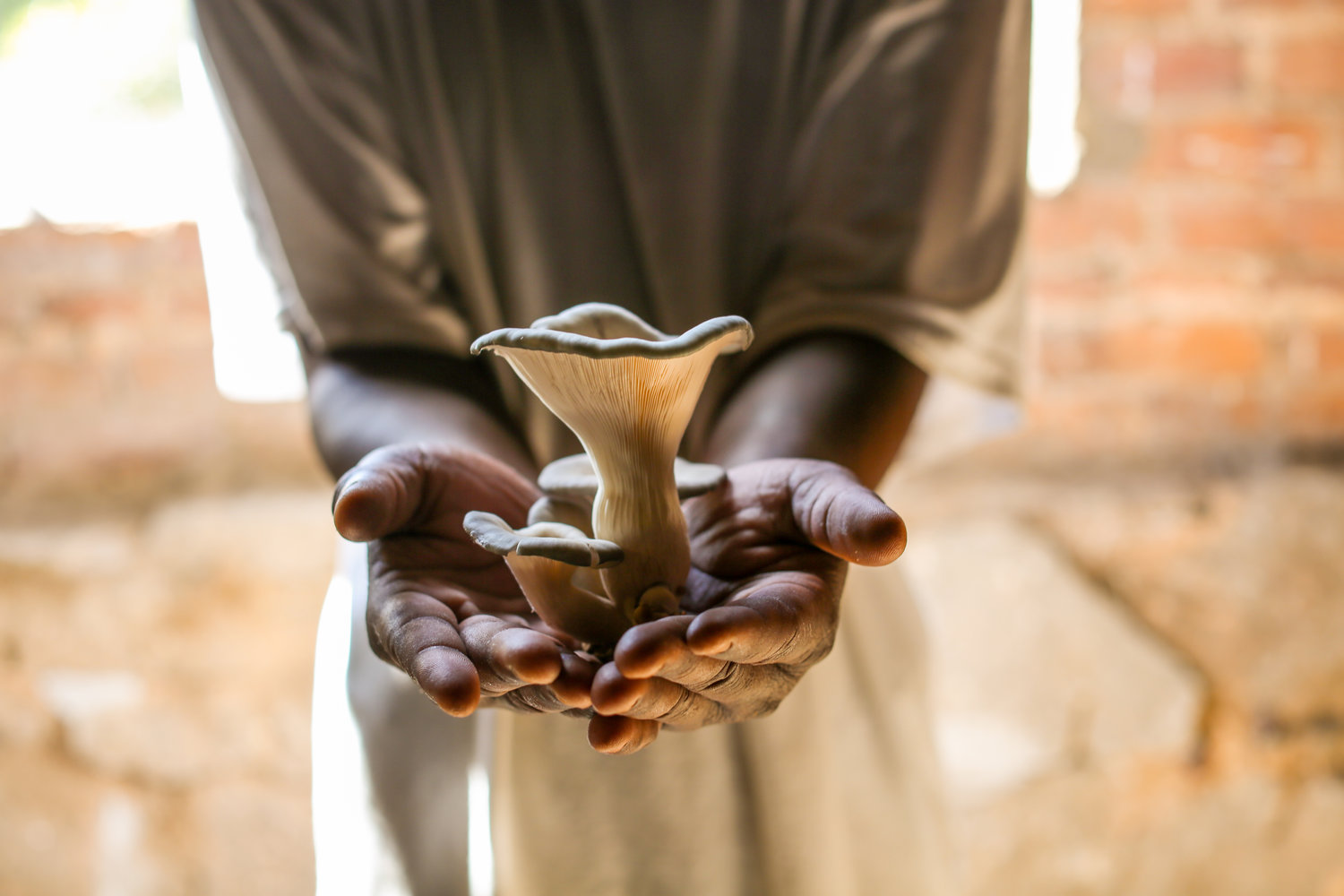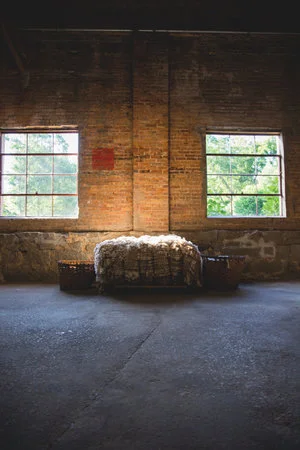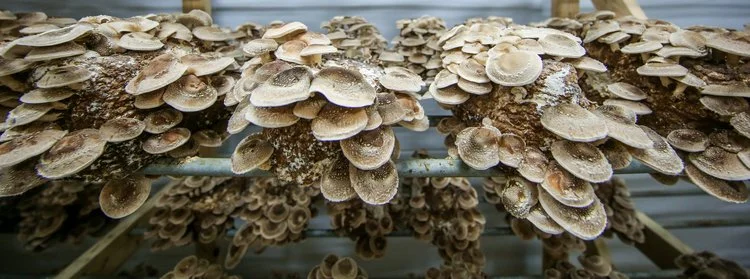Growing Something Good

ALTHOUGH IT’S EARLY MORNING HERE IN SPARTA, GA (POP. 1,293), THE FACT THAT IT’S SUMMER IN THE SOUTH IS UNMISTAKABLE. THE HEAT IS STARTING TO BUILD AND THEN RISE FROM THE PAVEMENT. A CHORUS OF CICADAS CLICKS AND BUZZES OVERHEAD IN THE TREES. RIPE GOLDEN FIGS WAIT TO BE PLUCKED FROM THE 40 BUSHES OUTSIDE THE BRICK FACADE OF THE OLD SPARTA FURNITURE MANUFACTURING CORPORATION.
As in many small towns across the South, the prospects for economic upward mobility or even stability for locals here seems to have stalled and withered on the vine over time — ever since cotton’s reign as king ended follow - ing the Civil War and the arrival of the boll weevil in Georgia around 1915. Before that, in its heyday, Hancock County was one of the state’s richest. Now, most people who grow up here leave in search of something more, locals will tell you.
The lack of opportunity, and often hope, is real and backed by figures. The poverty rate of 30.4 percent is more than twice the national average. In Sparta in 2014, the median household income was $24,415, while nationally it was $53,657. Unemployment is several points above the national average. One of the biggest economic drivers here is a state prison right outside of the city limits. But the town is just far enough from Lake Oconee that none of its growing prosperity spills its way.
Robert and Suzy Currey, 76 and nearly 73 respectively, never expected to be rooted here in the seat of Hancock County. Yet, as Robert puts it, perhaps this is the most important chapter in his life. Despite the bleak economic status of the town, everything seems right here, in the Curreys’ little corner of it. It doesn’t take long to see that the Curreys are a warm, welcoming couple as you walk the property with them and their dog, Rives. The pooch lives the life of Riley, sniffing chickens and finding mud to get into — a true farm dog despite his standard poodle pedigree.
ABOVE: A bale of cotton sits in the warehouse as a nod to Hancock County’s agricultural past.
“WE NEED TO GET UP EVERY DAY AND THINK ABOUT WHAT WE CAN DO THAT IS RIGHT.”
“We thought if we bought this house we could have a really nice garden,” Suzy says. “We have a connection to the soil. It’s a good feeling. It’s special when you can get your hands in the dirt.” This old house built in the 1840s is what drew the Curreys here in 2002. But it’s the community and what they’ve built that has called them to stay.
ABOVE: Ned Tyus, 90, has been with Elm Street Gardens since the beginning.
Sparta is in the country, about an hour and 15-minute drive to the west of Augusta and the same south of Athens. It’s more than an hour and a half from Atlanta. Because of the tough economic environment and rural location, it can seem like there isn’t much to get excited about. The latest things to make national headlines about the town are centered on racial injustice and alleged voting rights violations. Locally, the big news is that the courthouse that burned down two years ago has been rebuilt. But people here and around Georgia are starting to talk. There’s something else going on in Sparta, something good.
SOMETHING TO TALK ABOUT || Since the Curreys moved here, they’ve transformed what they thought would be a nice spot for a family garden behind their once vacant and rundown antebellum house into something bigger. After taking a couple of years to clear the brush from the lot, Elm Street Gardens is now a more than four-acre, certified organic, no-till farm that grows vegetables. What it yields can be found for sale at Atlanta-area farmers markets, including those held on the weekends in Morningside and Freedom Park near the Carter Center.
The organic gourmet mushrooms grown across the street from the Curreys’ house at the site of the old Sparta Furniture Manufacturing Corporation are snapped up by some of the most upscale restaurants in the Atlanta area, such as Bacchanalia and Kimball House. Others are sold at a couple of Atlanta Whole Foods Market locations and some can be bought at the Grant Park Farmers Market. The venture that produces them is known as Sparta Imperial Mushrooms. Robert lovingly refers to it as “a different little kind of business with a big social agenda.”
Between the two businesses, the Curreys have been able to hire a handful of their neighbors. The idea is for the businesses to continue to grow so they can hire more folks and generate more interest in the area. “It brings people to Sparta,” Suzy says. “You want to do what you can to make the community a better place to be.” Part of that is showing people that Elm Street’s way of growing vegetables is something most folks can do, if they have a small yard. It’s “an urban farm in a country town,” says Josh Plymale, one of two farm managers.
Jessica Legendre, the other farm manager, says the raised beds (which don’t require heavy machinery to create) and permanent mulching (which cuts down on the need to weed) make it possible for lots of people to replicate. “It makes this way of farming accessible.”
Suzy says the idea to take items to market stemmed from the fact that they produced more than expected. “The idea was to feed our family in Atlanta and ourselves,” Suzy says. But they found they had a bumper crop. The Curreys soon started wondering what else they might grow other than pole beans, tomatoes, arugula and the like. The idea for the mushrooms came about soon after.
ABOVE: Some of the shiitake that fruit on racks here will be destined for gourmet dishes in upscale Atlanta restaurants.
FUNGUS AMONG US || Inside the old furniture manufacturing building, with its wood beams and filtered light, are three long and shiny metallic greenhouses. One is a lab and the others, incubators. Inside, gourmet blue oyster, shiitake and lion’s mane mushrooms grow. They sprout in bags of sterilized sawdust and organic grain, and then they fruit or grow to their full size on wire racks. Depending on the variety, it can take anywhere from two weeks to two months in all, explains mycologist Kevin Frazier, the resident mushroom expert. Sparta Imperial Mushrooms produced their first crop in 2013. “Robert’s definitely doing a lot,” Frazier says of Currey. “Around here there’s not a lot of job opportunities. We’re just trying to do what we can to create jobs for people here in one of the highest unemployment areas in Georgia.”
One of the folks who works on the farms is 90-year-old Ned Tyus, a Hancock County native who once upon a time spent six months living in New York before deciding it wasn’t for him. On this day, he is making sure the vegetables are getting watered.
A WALK IN ANOTHER MAN’S SHOES || Robert is the son of a self-made Tennessee banker. Suzy is the daughter of a Red Cross worker; her grandfathers were ministers. For most of their years, the Curreys lived in Atlanta managing the Currey & Company furniture business and raising their family. Following their move to Sparta, yet far from total retirement, the Curreys have tackled their new life with gusto. What drives them?
“It’s trying to do what’s right,” Robert says. Once they moved, it wasn’t too long before Robert started to get involved around town. He made the decision to speak to neighbors. He says if not, he’s doubtful it would have happened.
Here, in Sparta, it turns out that he is in the racial minority and people initially tend to keep to their own. Currey is white. The majority of Sparta residents are African-American. When he grew up in Tennessee and for most of his adult life in Atlanta, Currey says he only knew and interacted with a few black people. “Having come here and had this experience of being the minority and having people dislike me — not because they knew me or I had ever said a word to them, but because of what color I am — has made me a new person,” Robert says.
When it happened here for the first time, it didn’t deter Currey from making himself part of the community, getting involved and, in turn, getting to work. For him, that is the whole thing. This new life in an unexpected place gave him the chance to “walk in another person’s shoes.” He says “seeing things” is everything. And many people don’t look at what’s happening in their own community.
“How can I sit here and not work on community efforts? I live in a needy community. I live in a low-income community. I live in a segregated community. I live in a not-quite food desert. That’s where I live, and so I want to do something about it.”
SECOND ACT: AN AWAKENING || Once he started to understand things in Sparta, Robert got involved in one of the local food pantries — Hancock Helping Hands Crisis Relief. “Our experience here in Sparta and Hancock County tells us that we need to be working on all this stuff in the community and we need to be working on stuff that brings the community together,” he says.
Currey counts his blessings; it’s part of his reason for being so active. Getting involved? How can he not, he says. “It’s not a choice, in my view. And what I want is an inclusive community. I am uninterested in black and white.
ABOVE: A wooden bowl features Sparta Imperial’s bounty
ABOVE: Standing vigil on the back porch, Rives looks out onto Elm Street Gardens’ rows of vegetables.
“IF YOU’RE 76 YEARS OLD LIKE ME AND YOU’RE PLANTING FRUIT TREES THAT WILL BEAR FRUIT FOR YEARS TO COME, YOU’VE GOT TO BE AN OPTIMIST.”
I am interested in an inclusive community, but I live in a black and white world. And so I do everything I can not to. Look, we have to come together to live these lives.” That’s why they are also involved in a Hancock community group.
Robert recognizes that “in all communities, black and white, you know there’s Baptist and Methodist, there is AME, there’s all these churches and all these little pods of people, but we all need to be coming together. We need to be looking at our opportunities and issues together. And then working together to deal with them. We just have our eyes closed.” In his matter-of-fact way, he implores others to take a look around at the needs of their own communities. “America needs to wake up,” he says. “I’m most familiar with the Southeast, but there are little towns like this all over the country that are needy communities, that need social services, that need more food, that need better food, that have all these needs.”
But that doesn’t mean that folks living in the suburbs or cities where his mushrooms are featured in fancy dishes as part of a four-course meal get a pass. Need exists in big population centers as well. He acknowledges that being aware of inequalities and needs, and in turn making the decision to be of service, may not come as second nature to folks. He says that’s especially true if you come from a community of people who have “never known ‘want.’ ” But there are needs everywhere, especially around food accessibility, he says.
“If you had your eyes open, you’d know that there is a big issue with food in America,” he says. It’s especially an issue for lower income and older folks. “I think most people have their eyes closed. You want to look at a food desert? Go to southeast or southwest Atlanta. You can see one within three miles of where you live,” he tells Atlantans.
He draws distinctions between talking about issues facing your community, economically supporting efforts to solve it and getting involved personally. “If I lived on Moores Mill Road in Atlanta, in northwest Atlanta, I could go two miles and find a food desert where there is not a grocery store in the low-income neighborhood,” he says.
Because of transportation difficulties, people often turn to convenience stores and prepared foods that are not as nutritious and can lead to health issues. The food itself can be expensive.
ABOVE: Rives, who is named after one of the original owners of the property, sits loyally by owner Robert Currey’s side.
The need is here, right under our noses; so let’s act, Robert says. “I am suggesting that we need to get up every day and think about what we can do that is right.”
For Robert, he started small in Sparta. First, he made a donation to the local food pantry when asked. The pantry helps about 460 families a month meet their food needs. From there, he started volunteering at the food pantry. He then asked to go to a board meeting and eventually became the chair of the board.
Suzy’s on the library board. They are big supporters of Relay for Life, a fundraising event to fight cancer. And each year they host a picnic for the whole town.
When asked why it is important to act, Robert is emphatic: “You look at the community, and you look at the needs of the community and if you don’t act — you’re derelict in your spirit.”
A HISTORY AND FUTURE OF TRYING TO DO WHAT ’S RIGHT || As you walk around the garden and surrounding blocks of the town, Robert is quick to speak and wave to everyone who drives by as he shows his visitors what is planted where. Did we know that the asparagus that lines the fence makes great greenery for floral arrangements with its fern-like fronds? Or how about how okra is related to the tropical hibiscus? You can tell from its distinctive yellow-petaled blossoms with a dark center.
The realization that he is so passionate about social justice didn’t come to him until recently. But glimmers of it can be seen beneath the surface in what they started at their original business — Currey & Company. Now run by their son Brownlee, it manufactures home furnishings and lighting and has been doing so since 1988. Its mission is to serve its customers and employees in “an exemplary manner through a culture which encourages all to flourish.”
To promote that growth, they back their statement with college course offerings, ESL classes and wellness trainings (consisting of exercise and nutrition classes) for all employees — for those on the assembly line to those in the front office. And they are happy to see folks take advantage of them and grow, whether that helps them secure citizenship, a promotion at the company or move on to other opportunities. “I’m proud of it,” Suzy says. “It works for people, and it works for us. We have really loyal people. I wish that more businesses could see that if a small company like ours can do it, they can do it.”
As for his plans for his Sparta businesses’ futures, Robert doesn’t see any reason to stop, he says, as we stand outside of the old furniture factory turned mushroom farm. The side of the road is lined with those fig bushes and persimmon trees.
“The hope is to keep growing the business and hiring,” he says. “If you’re 76 years old like me and you’re planting fruit trees that will bear fruit for years to come, you’ve got be an optimist,” he says with a smile.








